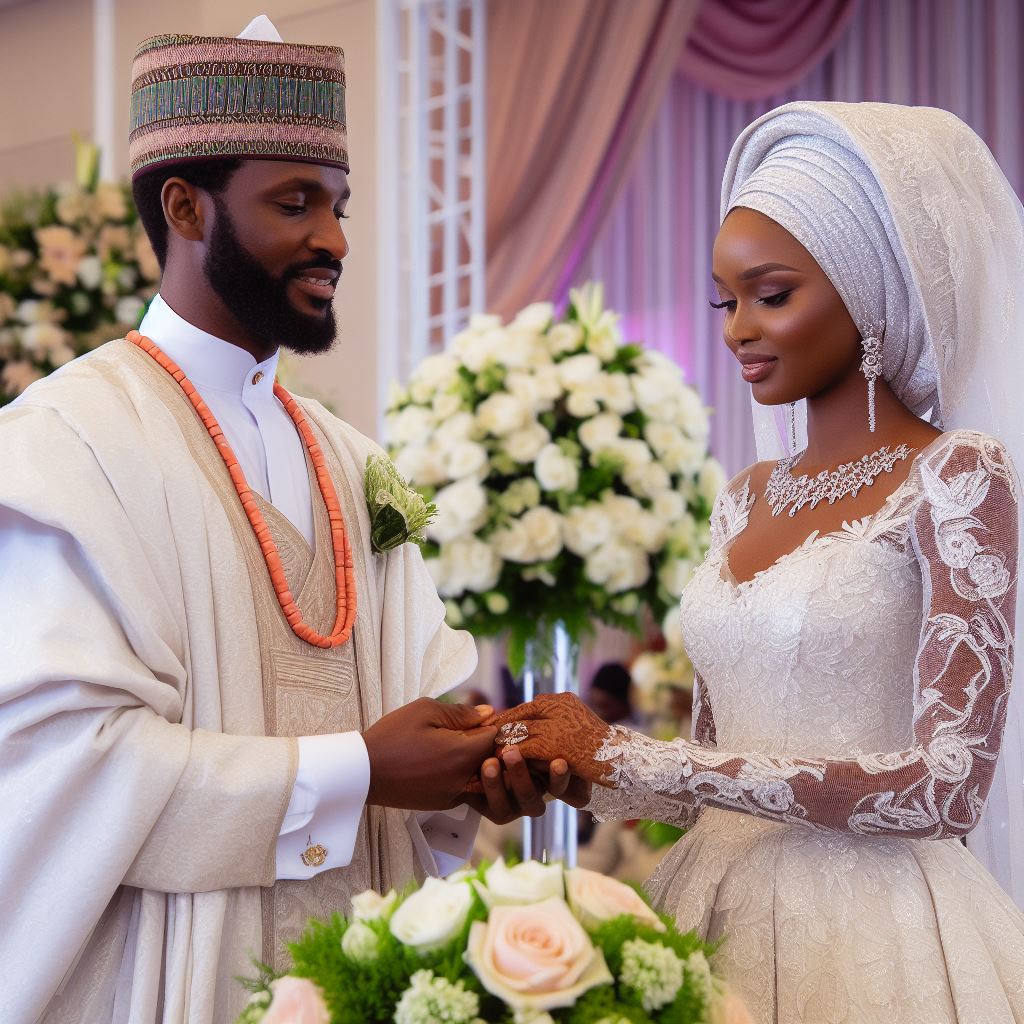Bridging Religion: Christian-Muslim Marriage Tales
Last Updated on January 28, 2024
Introduction
Christian-Muslim marriages can often face challenges due to religious differences.
This blog post explores the importance of bridging religion in such marriages and the purpose of this post.
Brief Overview of the Topic
Christian-Muslim marriages have become increasingly common in today’s multicultural society.
These unions bring together individuals from different faiths, resulting in unique dynamics and potential conflicts.
Importance of Bridging Religion in Christian-Muslim Marriages
Bridging religion in Christian-Muslim marriages is crucial to fostering understanding, respect, and harmony between partners.
It allows couples to navigate religious differences and build a strong foundation for their relationship.
Purpose of the Blog Post
The purpose of this blog post is to shed light on the challenges faced by Christian-Muslim couples and provide practical guidance on how to bridge the gap between their religious beliefs.
It aims to offer strategies for fostering mutual understanding, tolerance, and love in mixed-faith marriages.
By exploring real-life tales and sharing experiences of Christian-Muslim couples, this blog post intends to inspire and offer practical advice to those navigating similar relationships.
Ultimately, it strives to promote empathy, acceptance, and a celebration of diverse religious backgrounds within the context of marriage.
In short, understanding the importance of bridging religion in Christian-Muslim marriages is vital for the success and happiness of these unions.
This blog post aspires to provide valuable insights and guidance to couples embarking on this unique journey of love, faith, and compromise.
Understanding Christian-Muslim Marriages
Definition and context of Christian-Muslim marriages in Nigeria
- Christian-Muslim marriages refer to unions between individuals from different religious backgrounds, namely Christianity and Islam.
- In Nigeria, a country with a diverse religious population, Christian-Muslim marriages are quite common.
- These marriages bring together individuals who hold different beliefs and traditions, creating a unique interfaith dynamic.
Common challenges and misconceptions
- Christian-Muslim marriages often face challenges due to differing religious practices and cultural expectations.
- Misconceptions and prejudices about each other’s religions can also cause tension and misunderstandings.
- Concerns regarding religious upbringing of children and participation in religious rituals can arise.
Need for open dialogue and mutual respect
- Open dialogue between partners is crucial in Christian-Muslim marriages to navigate differences and promote understanding.
- Mutual respect for each other’s religious beliefs and practices is essential for a harmonious relationship.
- Couples should actively seek to learn about and appreciate each other’s faith, fostering a sense of unity.
Takeaways
- Christian-Muslim marriages involve individuals from different religious backgrounds in Nigeria.
- Challenges arise from divergent religious practices and cultural expectations.
- Misconceptions and prejudices about each other’s religions can create tension.
- Open dialogue and communication are vital in promoting understanding and resolving conflicts.
- Mutual respect for religious beliefs and practices is crucial for a harmonious Christian-Muslim marriage.
By addressing the definition, context, challenges, and need for open dialogue and mutual respect in Christian-Muslim marriages, it becomes evident that these unions require understanding and patience from both partners.
Embracing diversity while fostering unity can lead to strong and fulfilling interfaith relationships.
Read: The Role of Witnesses in Completing Nigerian Marriage Forms
Navigating Different Belief Systems
Importance of understanding each other’s faith
Building a strong foundation requires a deep understanding of each other’s religious beliefs.
Respecting and acknowledging the significance of faith in a Christian-Muslim marriage is crucial.
Understanding each other’s faith promotes empathy, compassion, and tolerance towards differences.
Open discussions about religious practices and beliefs foster a sense of unity and shared values.
Learning about each other’s faith allows couples to find common ground, creating a harmonious relationship.
Strategies for effective communication and compromise
Active listening is vital in a Christian-Muslim marriage to understand and acknowledge each other’s perspectives.
Regular and open communication about religious practices helps in finding common solutions and compromises.
Respecting and valuing each other’s opinions, even when they differ, strengthens the bond between partners.
Seeking guidance from religious leaders who promote interfaith understanding can provide valuable insights.
Establishing boundaries and mutually agreed-upon rules enables both partners to practice their faith comfortably.
Role of families in supporting interfaith marriages
Interfaith marriages, particularly Christian-Muslim unions, benefit greatly from family support.
Open and honest conversations with both families about religious differences are essential.
Create a supportive environment encouraging dialogue and understanding.
Educate family members about your partner’s religion to foster acceptance and respect.
Highlight shared values between Christianity and Islam to demonstrate the potential for harmony.
Involve families in celebrations and traditions from both religions to strengthen the sense of belonging.
To succeed, couples must respect and acknowledge the significance of faith in their relationship.
Empathy, compassion, and tolerance toward differences are crucial for unity.
Effective communication and compromise are key strategies for bridging the gap between Christianity and Islam.
Engage with religious leaders promoting interfaith understanding for valuable insights and support.
In fact, navigating different beliefs in a Christian-Muslim marriage requires understanding, effective communication, and family support.
Embrace and respect each other’s faith for a harmonious relationship.
By valuing open dialogue, compromise, and involving families, couples can bridge the gap between their religious beliefs, fostering love, and unity.
Read: The Legal Implications of a Nigerian Marriage Contract

Legal and Cultural Considerations
Nigerian laws and regulations related to interfaith marriages
- Nigerian laws require couples to specify their religious affiliation before getting married.
- If the couple belongs to different religions, they may face challenges in obtaining legal recognition.
- The Marriage Act of 1990 allows for marriages between Christians and Muslims, but with certain conditions.
- Both parties must consent to the marriage, and the non-Muslim partner may need to convert to Islam.
- If the non-Muslim partner refuses to convert, the marriage may not be legally recognized under Nigerian law.
Cultural acceptance and social pressures faced by couples
- In Nigerian society, interfaith marriages are often met with skepticism and even opposition.
- Families and communities may place social pressures on the couple to conform to their religious norms.
- Cultural beliefs and traditions can create barriers, leading to potential conflict and estrangement from loved ones.
- The stigma attached to interfaith marriages can affect the couple’s emotional well-being and relationship.
Ways to overcome legal and cultural obstacles
- Communication and mutual understanding are vital foundations for addressing legal and cultural challenges.
- Couples should engage in open and respectful dialogue about their religious beliefs and cultural expectations.
- Seeking legal advice and understanding the intricacies of Nigerian marriage laws can be beneficial.
- Building a support network of like-minded individuals or couples who have faced similar challenges can provide guidance.
- Being proactive in educating friends, family, and the community about the legitimacy and beauty of interfaith marriages.
- Embracing compromise and finding common ground in religious practices can foster a sense of unity within the marriage.
- Exploring shared values and traditions that transcend religious boundaries can help bridge the cultural divide.
- Engaging in pre-marital counseling or seeking guidance from religious leaders who promote tolerance and understanding.
- Remembering that love and respect should be the foundation of any successful marriage, regardless of religious differences.
Read: Drafting a Fair Marriage Contract: Best Practices
Success Stories and Lessons Learned
Real-life examples of successful Christian-Muslim marriages in Nigeria
- Sarah, a devout Christian, and Ibrahim, a devoted Muslim, have been happily married for over a decade.
- Fatima and John found love and respect for each other’s beliefs, resulting in a harmonious Christian-Muslim marriage.
- Blessing and Hassan share a strong bond based on understanding, trust, and a mutual respect for their diverse religious practices.
- Esther and Ahmed have proven that love conquers all obstacles, integrating their Christian and Muslim traditions seamlessly.
Key factors contributing to the success of these marriages
- Open-mindedness and respect towards each other’s religious beliefs and practices.
- Effective communication, allowing space for dialogue, and resolving any conflicts peacefully.
- Willingness to compromise and find common ground in areas where religious practices may differ.
- Support from friends and family who embraced their union and celebrated their love rather than focusing on religious differences.
Lessons that can be drawn from these experiences
- Love knows no religion – successful interfaith marriages are possible with understanding and love as the foundation.
- Open and honest conversations about religious beliefs, expectations, and practices are crucial to building a strong foundation.
- Mutual respect and appreciation for each other’s faith foster a harmonious environment within the marriage.
- Constant communication and willingness to learn from each other’s religious traditions help create lasting bonds.
- Surrounding oneself with a supportive community that accepts and celebrates the union despite religious differences is essential.
Basically, these success stories demonstrate that Christian-Muslim marriages in Nigeria can thrive despite the potential challenges.
The key factors contributing to their success include open-mindedness, effective communication, compromise, and support from friends and family.
The lessons learned from these experiences emphasize the importance of love, understanding, respect, and constant learning within interfaith marriages.
By embracing diversity and focusing on common values, Christian-Muslim couples can build strong and meaningful relationships that transcend religious differences.
Read: The Role of Dowry in Nigerian Marriage Agreements
Challenges and How to Address Them
Identifying common challenges faced by Christian-Muslim couples
- Overcoming societal prejudice and stereotypes towards interfaith marriages.
- Struggling with conflicting religious beliefs and practices within the marriage.
- Navigating cultural differences, traditions, and customs.
- Dealing with judgment and criticism from family, friends, and the wider community.
Addressing these challenges requires open communication, mutual respect, and a willingness to compromise.
Strategies to handle religious differences and conflicts
- Promote understanding and education about each other’s faiths.
- Encourage open discussions and debates about religious beliefs and practices.
- Find common ground and shared values to build a foundation for the marriage.
- Respect each other’s religious practices and participate in them when appropriate.
- Seek guidance from religious texts and scholars to find solutions to religious conflicts.
By adopting these strategies, couples can work together to create a harmonious and respectful interfaith marriage.
Seeking support from religious leaders and counseling services
- Consult religious leaders who have experience with interfaith marriages.
- Seek pre-marital counseling to address potential challenges and conflicts.
- Attend couple’s therapy to improve communication and relationship dynamics.
- Join support groups or communities of Christian-Muslim couples for guidance and understanding.
Engaging with religious leaders and counseling services can provide valuable guidance and support for couples facing challenges in their Christian-Muslim marriage.
In essence, Christian-Muslim marriages can face various challenges due to societal prejudices, religious conflicts, and cultural differences.
However, by identifying these challenges, adopting effective strategies, and seeking support from religious leaders and counseling services, couples can navigate through the difficulties and build a strong and harmonious relationship based on love, respect, and understanding.
Discover More: Historical Perspectives: The Evolution of Honour in Nigerian Marriages
Conclusion
Bridging religion in Christian-Muslim marriages is crucial for the harmonious coexistence of individuals from different faiths.
It allows couples to build a strong foundation based on mutual respect, understanding, and love.
The importance of bridging religion cannot be overstated.
It serves as a bridge that connects two individuals with different beliefs, helping them navigate the challenges that may arise due to their differing religious backgrounds.
Open-mindedness and respect play a vital role in fostering healthy interfaith relationships.
By embracing differences and learning from one another, couples can create an environment of acceptance and growth.
It is essential for society as a whole to encourage and support interfaith relationships.
By doing so, we can break down barriers, dispel stereotypes, and promote unity within our diverse communities.
In Nigeria, where religious diversity is prevalent, it is even more crucial to foster understanding and unity among Christians and Muslims.
By actively engaging in dialogue, seeking common ground, and respecting each other’s beliefs, we can build a more harmonious and inclusive society.
In a nutshell, let us strive for an open, respectful, and inclusive society that embraces interfaith marriages and celebrates the beauty of different religious traditions.
It is through bridging religion that we can create a future where love transcends differences and becomes the foundation of a vibrant and united Nigeria.


